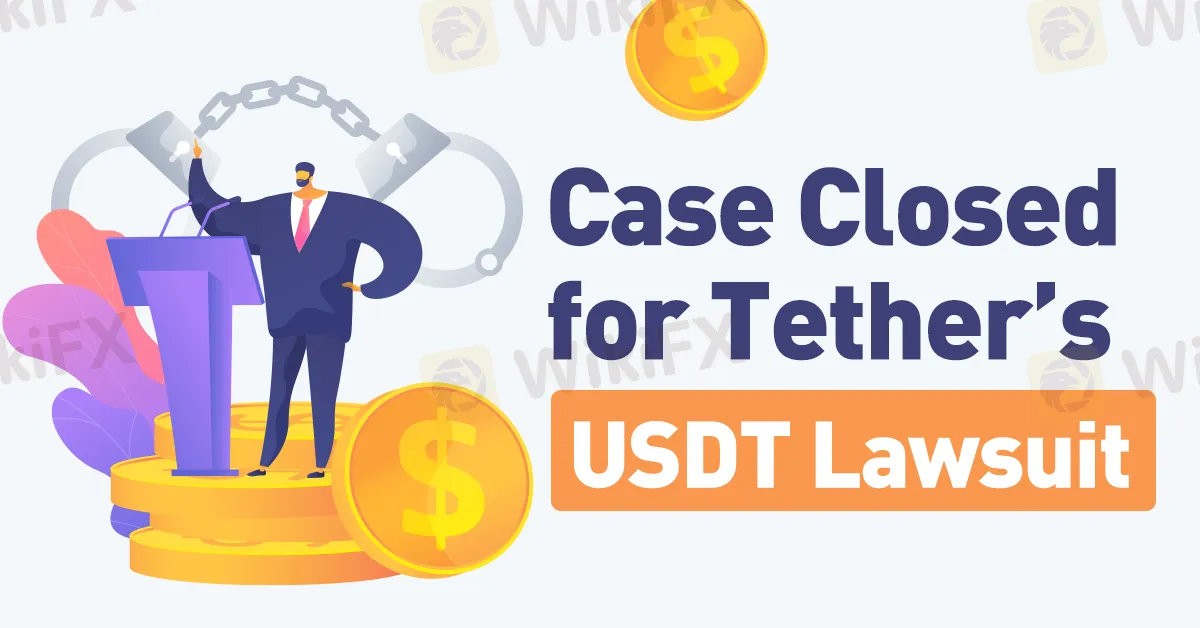简体中文
繁體中文
English
Pусский
日本語
ภาษาไทย
Tiếng Việt
Bahasa Indonesia
Español
हिन्दी
Filippiiniläinen
Français
Deutsch
Português
Türkçe
한국어
العربية
Case Closed for Tether’s USDT Lawsuit
Abstract:In a tangled legal showdown involving Tether and Bitfinex, the recent resolution in the court case raises intriguing questions about stablecoin security and alleged market manipulation within the cryptocurrency sphere.

The legal battle confronting Tether and Bitfinex has drawn to a close as the plaintiff chose not to contest the final court verdict, a resolution confirmed by Tether, the stablecoin issuer, in a recent statement.
The legal battle between Tether and Bitfinex has been a long and winding saga that has spanned multiple jurisdictions and involved a variety of allegations. Back in 2017, Shawn Dolifka and Matthew Anderson, the plaintiffs, accused Tether of misleading assertions regarding the USDT stablecoin's one-to-one backing by the U.S. dollar. Yet, the U.S. District Court for the Southern District of New York dismissed their claims in August, citing insufficient evidence of harm in the lawsuit.
Dolifka and Anderson contended that Tether lacked ample reserves matching the circulating USDT volume. They argued that the reserves extended beyond solely U.S. dollars, comprising over-collateralized loans and various assets, ultimately depreciating the stablecoins value.
Tether countered these claims by asserting a lack of solid evidence supporting any decrease in USDT's value. Consequently, the court favoured Tether, highlighting the lawsuits absence of factual substantiation for the alleged devaluation.

The lawsuit, cantering on Tethers misrepresentation of stablecoin backing, concluded as the plaintiff chose not to pursue further legal recourse, acknowledging the court's decision.
In response to the resolution, Tether criticized Dolifkas initial action as baseless and commended his withdrawal of the appeal. The stablecoin issuer reiterated its resilience against baseless litigation aimed at monetary gains.
Despite this legal victory, a New York judge previously mandated Tether and Bitfinex to disclose financial records concerning the stablecoin's backing. Additionally, Bitfinex sought dismissal of a lawsuit accusing them of market manipulation, labeling it as frivolous, but the court accepted the plaintiffs' requests for key financial documents.
A separate class-action lawsuit targets Bitfinex and Tether, alleging fraudulent inflation of the cryptocurrency market by issuing uncovered USDT tokens. The plaintiffs characterize this alleged sophisticated scheme as the “biggest bubble in human history.”

Disclaimer:
The views in this article only represent the author's personal views, and do not constitute investment advice on this platform. This platform does not guarantee the accuracy, completeness and timeliness of the information in the article, and will not be liable for any loss caused by the use of or reliance on the information in the article.
Read more

Global Brokers Vs. Indian Rules: Why They Struggle in India
RBI issued a warning last year against 75 forex brokers. Those brokers are globally popular and regulated in other countries, but they are banned in India. Only few brokers even have physical offices located in India. So, why do global brokers face so many challenges in entering the Indian market?

Tokenized Stocks: Innovation or Just Another Wrapper?
While tokenized stocks promise global, round-the-clock trading, many platforms only offer synthetic exposure similar to CFDs. Without shareholder rights or deep liquidity, their added value remains in question.

Crypto Craze Fizzling Out? Here is Why
The Crypto Craze among users is fading out. The wave of Cryptocurrency has slowed down. But what are the major reasons why this has happened?

Reasons Why You Can't Trust UbitMarkets for Forex Investments
UbitMarkets is one more forex broker that scams investors under the guise of high returns. Check out our exposure story.
WikiFX Broker
Latest News
Tokenized Stocks: Innovation or Just Another Wrapper?
Gold Rush Again: What's Driving the Bullion Market Crazy Ahead of US Jobs Data?
XTB Launches Tax-Advantaged Retirement Accounts in Poland
Zaffex Broker Review
ECB Ends Easing Cycle, But The Eurozone Crisis Is Just Beginning
Amazon deploys its 1 millionth robot in a sign of more job automation
MT4 and MT5 Platforms - Helping Traders Up Their Forex Trading Game
A bare-bones deal is Europe's best hope in trade talks with the U.S., sources say
10-year Treasury yield remains higher despite weak ADP jobs report
Blueberry Markets Revamps its Website
Currency Calculator


